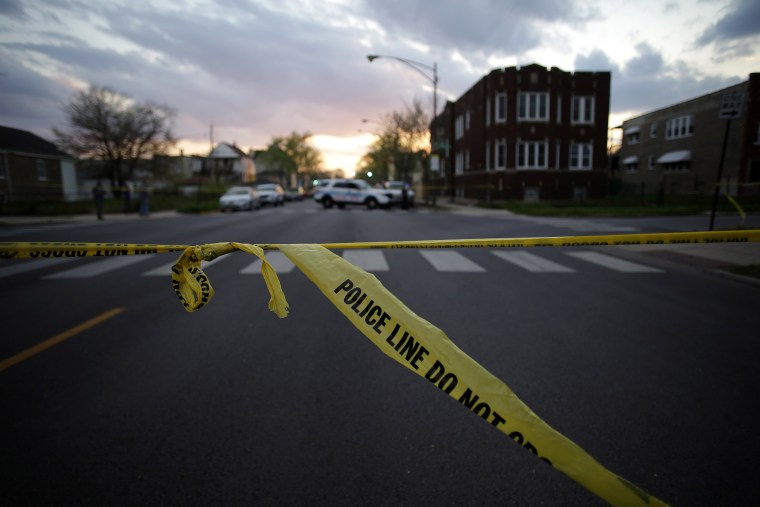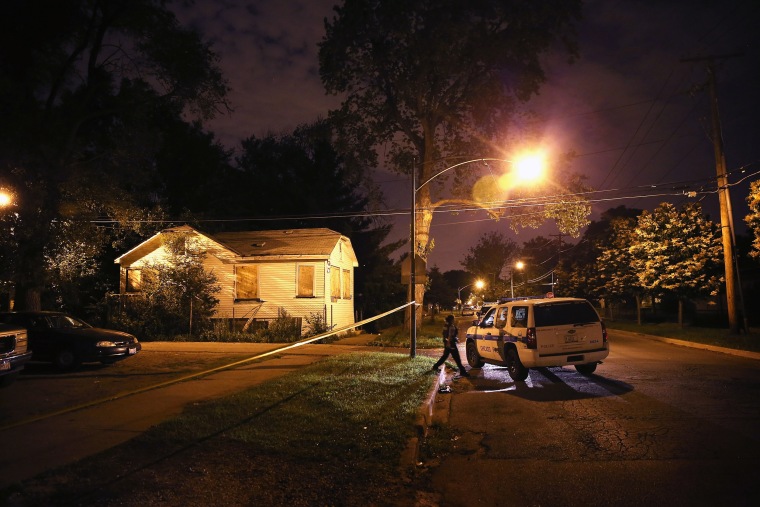When President Donald Trump offered this week to "send in the Feds" if Chicago authorities couldn't put a lid on violence, he didn't explain what exactly he'd have the government do.
Whatever he envisions, it probably already exists.
Agents from the federal government's premier crime-fighting units — the FBI, the Drug Enforcement Agency and the Bureau of Alcohol, Tobacco, Firearms and Explosives — work with Chicago police to combat gun-running, drug dealing and gangs, the forces that drive the city's rising murder rate.

The city also receives millions of dollars in federal grants to train and equip officers, and support anti-violence social programs.
And the Department of Justice is negotiating a civil settlement with the city that aims to end excessive use of force and build public trust.
Related: Trump to Chicago: ‘Fix’ Violent Crime or I’ll ‘Send in the Feds’
Chicago Mayor Rahm Emanuel has already said he'd welcome any kind of help.
"I'm going to take him up on that offer," he said in response Wednesday to reporters.
The president, who campaigned as the "law and order" candidate, has made a habit of calling out Chicago's murder rate and offering puzzling hints on how he'd handle it. There were 762 homicides in the city last year, nearly 300 more than 2015, and the pace continues to alarm: On Wednesday, six people were shot at a memorial for victims of gun violence.
In September, Trump said he'd press for Chicago to implement a stronger stop-and-frisk policy — even though the federal government has no say in local crime-fighting strategies. The tactic has been found in many cities, including Chicago, to be used disproportionately against black and Latino people, damaging public trust.
Related: More Stop-and-Frisk? Trump’s Suggestion Overlooks Major Problems With Tactic
Earlier this month, before taking office, the Republican president ribbed Emanuel, a Democrat and former top aide to Barack Obama, about Chicago's 2016 murder tally — the worst since the 1990s — saying, "If Mayor can't do it he must ask for Federal help!"
That was followed on Tuesday with a tweet saying that if "Chicago doesn't fix the horrible carnage going on," then "I will send in the Feds!"
White House spokesman Sean Spicer didn't' clarify much on Wednesday, when he told reporters that the president had been upset at "turning on the television and seeing people killed in shootings."
Asked what resources Trump would provide, Spicer said it could be "a bunch of things," including "aid" that could be requested through the Illinois governor.
Trump was asked about it in an interview with ABC News, which aired Wednesday night. He didn't provide many more details. "I will send in what we have to send in," he said.
He called Chicago's gun violence "very easily fixable" and offered some advice: "Maybe they're not gonna have to be so politically correct. Maybe they're being overly politically correct."
Related: Chicago Police Department Routinely Violated People’s Rights, Feds Say
But the Justice Department has found the opposite to be the case. In a report released two weeks ago, it outlined a litany of abuses by Chicago police over the last four years, including cops shooting at fleeing suspects, using physical force to retaliate against people and routinely botching investigations of misconduct. The force also has a longer, darker history that includes the torture of suspects and forced confessions.
Trump inherited that case, in which the Justice Department and Chicago are negotiating a consent decree that would force reforms. Trump and his pick for attorney general, Jeff Sessions, have said they oppose intervention in local police affairs. They could choose not to enforce it.
But former Civil Rights Division official Jonathan Smith said forcing reforms on Chicago police would make policing more effective and make the public feel like a partner, not a target.
"The community wants public safety more than anybody," Smith said. "They know also that if you just flood the streets with police and sweep people off corners, that will make the problem worse."
The notion of sending in "the Feds" also raised images of the National Guard, which was used in the 1960s — and in Baltimore two years ago — to quell urban unrest.
It is unclear such an option is even feasible.
Related: What Would Jeff Sessions Mean for the Future of Police Reform as Attorney General?
Chicago Police Superintendent Eddie Johnson told the Chicago Tribune: "I have no idea what he's talking about."
Emanuel, too, dismissed the notion.
He said he hoped the Trump administration would continue to fund grants that went not only to police but to other anti-violence initiatives, including programs that provide after-school activities and summer jobs for young people.
That, however, may be in jeopardy.
On Wednesday, Trump reiterated his promise to "crack down" on "sanctuary cities" that refuse to round up people who are in the country illegally. He signed an executive order that empowers federal officials to withdraw federal grants from those places. Chicago is one of them.
The executive order allows federal officials to determine what cities are sanctuary cities and to exempt grants "as deemed necessary for law enforcement purposes."
Emanuel was defiant. "We're going to stay a sanctuary city," he said Wednesday.
Sessions, who has favored an immigration crackdown, has been noncommittal about the future of crime-fighting grants to Chicago, telling Sen. Richard Durbin, D-Ill., that "resources are limited."
Ronal Serpas, who was superintendent of the New Orleans police in 2012, when federal agents were sent to help control an uptick in violence, said the assistance worked.
He urged Emanuel and Trump to set aside any partisan differences in the name of public safety.
"Chicago is clearly at a crisis where political sensitivities have to be put aside," Serpas said.

